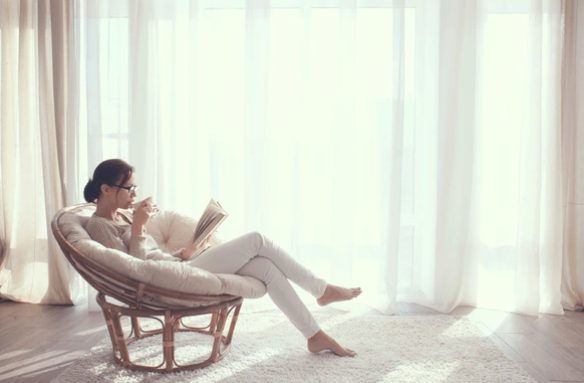Rest is sleep’s poor cousin. Something to fit in when we can
but rarely a priority. Yet taking time out for ourselves every day brings many
benefits of its own.
Busyness, or having lots of demands on your time, has become
something of badge of honour.
Asked how we are, we are as likely to answer ‘busy’ as we
are ‘good’ or ‘fine’ – almost like we are assuring ourselves we are in demand
and important, says psychologist and BBC radio presenter Claudia Hammond,
author of The Art of Rest: how to find respite in the modern age.
And research led by Columbia marketing professor Silvia
Bellezza shows that people perceive others who are busy – and who use products
indicating they are busy (like a Bluetooth headset for multitasking) – to be
important and impressive.
This cult of busyness has a downside, says Hammond, and it
is that we struggle to fit in rest.
What exactly is rest?
Rest is anything that helps you to relax, switch off from
worrying, take a break, and take a pause, says Hammond on the CBC (Canadian
Broadcasting Company) radio show Tapestry. Rest can be different for
everyone. It can be active (going for a walk or run) or passive (reading or
listening to music).
Rest is not the same as sleep. Sleep is an essential
function. Without it, every system of your body is affected, from your
cognitive function to your immunity. When you are sleep deprived, your body
will eventually force you to sleep.
Resting, on the other hand, is not valued nearly as much as
sleep. It is often something we fit in at the end of the day if we can, when
everything else is done.
Yet ‘waking restfulness’ is good for us – physically, by
reducing blood pressure and heart rate, and mentally and cognitively, through
boosting mood, memory and our ability to concentrate. Rest allows you to take a
break when you are awake to let your mind shut off.

What is stopping us resting?
Rest does not always come easily. You may put up barriers
that prevent you from taking time out, says PsychCentral. Some common ones
include:
- Believing rest is the same as
being lazy, and feeling guilty about it.
- Being a perfectionist and setting
yourself impossibly hard goals.
- “Even though we may not recognise
it as perfectionism, at times we are desperately trying so hard to be perfect
by doing, accomplishing, and achieving everything we set our minds to,” says
psychologist Dr Kelly Vincent. This may affect your ability to rest, she says,
because of a fear that your life will spin out of control if you engage in a
period of mental rest.
- Being uncomfortable or afraid to
rest. You may find you get bored when resting, or that having a rest means you
have to stop doing whatever it is you are doing and fear this will set you
back.
- Having invasive thoughts.
Ruminating and worrying can stop you fully resting. You may worry about getting
all your work done, what you are going to have for dinner, even what others
think about you resting!
The Rest Test
Claudia Hammond led a team in a 2019 study called The
Rest Test, the largest global survey on rest ever conducted. The online
study of 18,000 people from 135 countries found that regardless of income,
two-thirds of people said they wanted more rest.
Hammond says that while often we are very busy and have too
much to do, there is pressure to be achieving all the time. We live in an era
with information at the touch of a button, and our social media feeds are full
of people doing amazing things.
For many people in The Rest Test survey, the prospect
of switching off and resting was associated with anxiety and guilt.
“We set ourselves high standards,” says Hammond. “We want to
be fit, look a certain way, or cook amazing meals for our guests.”
Even during the pandemic there was almost a pressure to do
lockdown well, she says. “Pressure to learn new things, make amazing sourdough
bread – you needed some sort of achievement. Whereas the second time we had
lockdown it was enough to get through.
“And I think the other thing is that the boundaries between
work or not working have become really blurred, because technology has allowed
them to do that,” says Hammond. “With so many people working from home during
the pandemic, that is only increased.”
How much rest?
If you are thinking to yourself “well, I cannot fit in any
time to rest because I am too busy,” Hammond says that we all have wasted
moments in our day that we could reframe as resting.
This could be time commuting on a train or bus, time spent
in a queue, or minutes spent waiting for someone or something.
Hammond says she new reframes wasted time as rest by
thinking “yeah, I am going to rest now for 10 minutes, I have got a gift now of
a break.”
When you are working and caring – whether for children or
older relatives – carving out rest time is difficult, Hammond admits. She
recommends prescribing yourself at least 15 minutes a day of something you find
restful. This could be having a coffee in your garden or balcony, going for a
walk, reading, or watching a favourite TV show.
Top 10 most restful activities
According to The Rest Test, these are the top 10
activities people find the most restful:
- Reading
- Being in a natural environment
- Being alone
- Listening to music
- Doing nothing in particular
- Walking
- Taking a shower or bath
- Daydreaming
- Watching TV
- Meditation or practising mindfulness